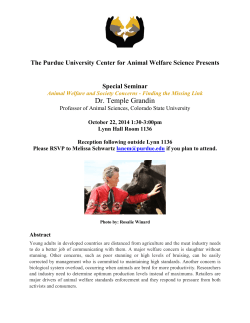
Animal Welfare Policy
Mission Statement Our business begins with the well-being of our animals. JBS is dedicated to ensur- ing the humane treatment, handling and slaughter of animals at all times. At JBS, animal welfare is embedded in the framework of our culture. We continually strive to improve our animal welfare efforts through the use of new technologies and the implementation of standards that meet and exceed regulatory requirements and industry guidelines. As the largest food protein company in the world, we have the ability to make a positive impact on the lives of many animals and we do this every day. Animal Welfare Policy Policy Statement At JBS, the proper and humane treatment of animals is addressed through standard operating procedures, verification, and process improvement, designed to assure animal welfare and product quality. All livestock destined and received for slaughter at JBS facilities are protected under this policy and will be treated humanely in accordance with JBS procedures and in compliance with USDA regulations. Our efforts to ensure the humane treatment of animals begins with producers and their dedication to providing animals within our supply chain with the utmost care and treatment. Our commitment to animal welfare continues as animals under our care are transported, unloaded and handled at our facilities. JBS has established and implemented animal welfare programs in all of our business units to promote accountability and transparency and to ensure that the humane treatment of animals remains a priority throughout every stage of the animal’s life. From procurement, transportation, operations, to quality assurance, every JBS employee is held accountable for the humane and ethical treatment of our animals. JBS Carriers JBS Carriers is responsible for providing safe transportation to over 1.5 million cattle each year. JBS Carriers is the critical link between our cattle suppliers and our processing facilities — delivering cattle every day in a manner that ensures humane handling during loading at the feedyard, a safe journey for both drivers and animals, and minimal stress of cattle during unloading at our facilities. Continued on Page 2 From Page 1 JBS Carriers takes pride in the safe and efficient transport of animals to processing facilities across the country. Our drivers bring a passion for the industry to work with them every day. JBS Carriers, in conjunction with JBS Five Rivers cattle feeding and the animal welfare department, provides drivers with animal handling and safety training. The training materials are based on the Master Cattle Transporter Guide, part of the National Cattlemen’s Beef Association’s (NCBA) Beef Quality Assurance (BQA) program, which is widely recognized as the industry standard for truck driver training. Animal handling and safety training play an important role in the development of our drivers. Our training, adoption of industry-wide standards, and the years of valuable experience many of our haulers possess, provide JBS Carriers with a fleet of seasoned, well-trained professionals committed to excellent service and the safety and comfort of the animals under their care. As a component of the animal welfare programs at each JBS processing facility, cattle transporters are audited daily to verify adherence to JBS humane handling standards and the American Meat Institute (AMI) Transportation Guidelines. Additionally, transportation audit criteria are included in annual audits conducted by third parties. The cattle transporters, schedulers, and plant personnel are in constant communication with one another, to ensure prompt delivery and safe unloading of animals at each facility. Questions? Contact communications@jbssa.com
© Copyright 2025















